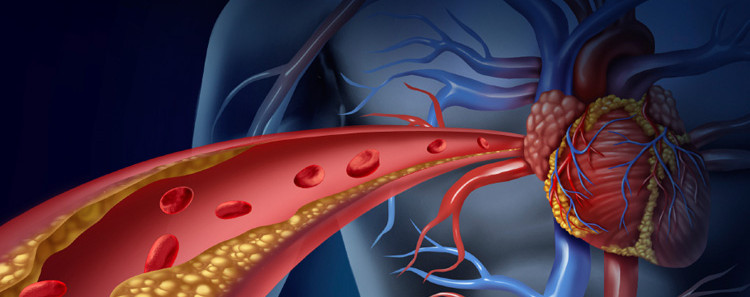Cholesterol is both our friend and foe – at normal levels, it is an essential substance for the body’s normal functioning, but if levels in the blood get too high, it becomes a silent danger that puts us at risk of a heart attack.
What is cholesterol?
Cholesterol is found in every cell of the body and has important natural functions. It is manufactured by the body but can also be taken in from food. It is waxy and fat-like in appearance.
Cholesterol is oil-based and so does not mix with the blood, which is water-based. It is therefore carried around the body in the blood by lipoproteins.
The parcels of cholesterol are carried by two types of lipoprotein:
- Low-density lipoprotein (LDL – cholesterol carried by this type is known as ‘bad’ cholesterol)
- High-density lipoprotein (HDL – cholesterol carried by this type is known as ‘good’ cholesterol).
- Contributes to the structure of cell walls
- Makes up digestive bile acids in the intestine
- Allows the body to produce vitamin D
- Enables the body to make certain hormones.
Cholesterol has four main functions, without which we could not live. It:
Cholesterol diet
The support charity for people with high cholesterol, HEART UK, has identified “six super foods” that actively lower cholesterol levels:
- Soya foods (15g a day) – soya milk, soya desserts, soya meat alternatives, soya nuts, edamame beans and tofu
- Nuts – a handful a day
- Oats and barley – providing the soluble fiber beta glucan
- Plant sterols/stanols – found in a wide range of foods
- Fruits and vegetables
- Foods rich in unsaturated fats – for example, canola and vegetable oils.
Go to the charity’s website for more information about foods that are good for cholesterol levels. HEART UK also lists foods that are bad for cholesterol levels:
- Butter
- Ghee
- Hard margarines
- Lard
- Fatty and processed meat
- Dairy fats.
What causes high cholesterol?
High cholesterol or hypercholesterolemia is also known as hyperlipidemia and dyslipidemia. It is a major risk factor for coronary heart disease, a cause of heart attacks, and reducing blood lipid levels lowers the cardiovascular risk.
High levels of LDL lead to a build-up of cholesterol in the arteries, whereas HDL carries cholesterol to the liver for removal from the body. A build-up of cholesterol forms part of the process that narrows arteries, called atherosclerosis, in which plaques form and cause restriction of blood flow.
Two types of cause lead to high cholesterol levels – modifiable and non-modifiable risk factors. The major two risk factors are highly modifiable – something can be done to change them:
- Diet
- Exercise and weight.
- Cholesterol (from animal foods, such as egg yolks, meat and cheese)
- Saturated fat (found in some meats, dairy products, chocolate, baked goods, and deep-fried and processed foods)
- Trans fat (found in some fried and processed foods).
Limiting intake of fat in the diet helps manage cholesterol levels, limiting foods, in particular, that contain:
Being overweight or obese can lead to higher blood LDL levels so exercise can help manage this risk factor.
The primary causes of hyperlipidemia are genetic – very high LDL levels are found in the inherited condition familial hypercholesterolemia. Other genetic conditions passed down from parents are: familial combined hyperlipidemia, familial dysbetalipoproteinemia and familial hypertriglyceridemia.
Abnormal cholesterol levels may also be secondary to the following:
- Diabetes
- Liver or kidney disease
- Polycystic ovary syndrome
- Pregnancy and other conditions that increase levels of female hormones
- Underactive thyroid gland
- Drugs that increase LDL cholesterol and decrease HDL cholesterol (progestins, anabolic steroids and corticosteroids).
Fast facts on cholesterol
Here are some key facts about cholesterol. Find more detail and supporting information in the article.
- Cholesterol is an essential substance that is produced by the body but is also available from foods.
- The greatest risk factors for high cholesterol are modifiable lifestyle choices – diet and exercise.
- High cholesterol levels can be inherited with the genetic condition, familial hypercholesterolemia.
- Having high cholesterol does not produce any symptoms.
- Cholesterol levels should be blood-tested once every five years.
- First-line ways to reduce cholesterol involve lifestyle changes.
- If lifestyle changes are unsuccessful or cholesterol levels are very high, lipid-lowering drugs such as statins may be prescribed.
- High cholesterol levels are an important contributor in the calculation of an individual’s risk of having a heart attack within the next ten years.


